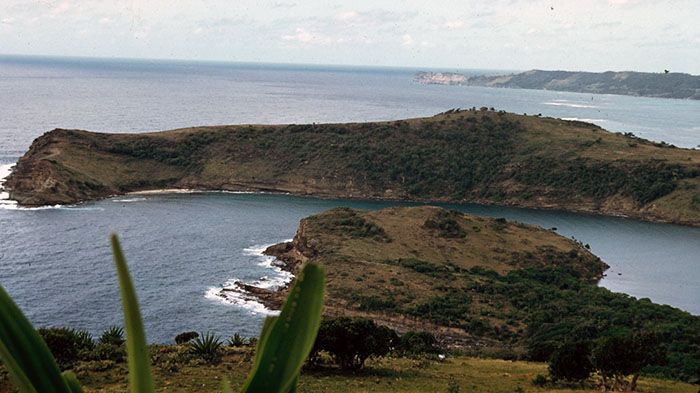In the fifteenth and sixteenth centuries, European mastery of certain technological innovation (compass, astrolabe, ship-building, weaponry) allowed Europeans to sail the open oceans, without having to follow coastlines. It was not long before Europeans had ventured far, far abroad and established a presence around the world.
European contact with non-European societies took many different forms. In Central and South America, the European presence meant the extermination of native societies; while in China, Europeans traded with a much more advanced society. True, it was not long before Europeans were able to dominate much of the world, largely with the help of gunpowder. The European age of exploration and expansion also fueled the dynamic economy of Europe and promoted the evolution of capitalism. The discoveries would lead to profound changes in European society and economy.
Suddenly, in the fifteenth century, Europe was confronted by the stark fact that it was not the only civilization in the world. In fact, some societies, such as in China, had reached intellectual and economic heights that were unimaginable to Europeans. For the first time the western church also had to acknowledge the existence of other religions. However, the adjustment required by Europe and the church did not come easily, and in many cases a very crude chauvinistic attitude developed.
The Age of Exploration ran simultaneously with the Renaissance and Reformation, and the three movements serve as the dividing line between the Middle Ages and the Modern world. While Michelangelo was reviewing his painting of the Sistine Chapel and Luther was tacking up his 95 Theses, Ferdinand Magellan (1480-1521) was preparing to set sail for his trip around the world.
The great age of discovery and exploration is usually framed by these two events:
1488, Bartolomeu Dias (1450-1500), a Portuguese nobleman, rounded the cape of Good Hope into the Indian Ocean.
1779, James Cook (1728-79), a British sea captain, was killed in the Hawaiian Islands.
There are many reasons/motives for the overseas explorations.
- Economic
- Make money. That's a pretty simple reason. Everyone (kings, queens, sea captains, traders, sailors, everyone) wanted to make money somehow either by
- finding gold
- or trading spices
- greed (it's a fine line between making a profit and greed.)
- Spread Christianity to the "unsaved souls" of the world
- Increase the power and prestige of kings and queens through the creation of vast overseas empires
- Adventure and glory, the conquistadors (why stay at home and be an impoverished, petty noble who is not going to inherit anything when you can go off and seek adventure, glory and wealth in far off lands). Conquistadors were know for their bravery, and also their absolute treachery and cruelty.
Portugal
- Prince Henry the Navigator (Infante Dom Henrique of Portugal, Duke of Viseu, 1394-1460), invented a lighter, sea-going vessel called the caravel; planned and organized expeditions to the West African coast, further and further south; established trading posts and forts; settled Madeira, Azores; by 1482 had reached Kongo
- Vasco da Gama (1460?-1524), was the first to reach India in 1498 after 10 months at sea; dangerous voyages but proved to be highly profitable
- The discoveries by Portuguese explorers allowed Portugal to create a very powerful overseas empire, largely centered in India and the spice islands.
Spain
- Christopher Columbus (1451-1506), a Genoan sailer in the employ of the Spanish monarchs, was the first to reach the new world in the Caribbean as he attempted to reach India by sailing westward; touched ground on Hispaniola in October 1492 ("Columbus sailed the ocean blue in 1492"); later additional voyages to the Caribbean and Central America
- Juan Ponce de León, 1474-1521, a Spanish explorer and first governor of Puerto Rico, explored Florida in 1513
- Ferdinand Magellan set out in 1519 to find a westward route to the spice islands, in late 1520 his ships rounded the southern tip of South America through what is now called the Straits of Magellan and reached the South Pacific; one ship and small crew completed the first circumnavigation and returned to Spain with spices in September 1522. Magellan was not one of the survivors; he had been killed in the Philippines.
- The discoveries by Spanish explorers allowed Spain to create a very powerful overseas empire, largely centered in Central and South America.
The Spanish and Portuguese empires were very different. Portugal largely controlled territory through its trading outposts, while Spain actually set up a "plantation" structure, Portugal, largely conducted through trading, Spain actually set up "plantations" (encomienda) relying on tribute and forced labor.
Others
- England came late to the discovery game: 1607 Jamestown and 1620 Plymouth colonies in North America
- Holland (Netherlands): the Dutch East India company, created 1602, proved to be the chief rival to the Portuguese in India and East Asia.
- France: in 1534 Jacques Cartier (1491-1557) established a claim to what is now Canada for France.
Finally, one important effect of the discoveries was to increase the likelihood that European powers were going to go to war. While there were plenty of issues in Europe itself, the overseas scramble for empires created another source of friction that could (and would) lead to war.
![]()
Some recommended online lectures and websites
- Wikibooks: World History/Ancient Civilizations (Age of Discovery and Imperialism)
- The Discovery of the New World and End of the Old
- Native America by Charles Kimball
- For extra credit please suggest to your instructor a relevant website for this unit of the course. Send the title of the site, the URL and a brief explanation why you find the information interesting and applicable to the material being studied in this unit.
